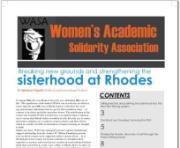
With the many challenges women academics face in the institutions of higher learning, it has become crucial that they support each other. The Women Academic Solidarity Association (WASA) is a dynamic network of women at Rhodes established to do just that.
The Association is geared towards strengthening and empowering female staff and postgraduate scholars to further their studies and advance their careers.
Co-chair Siphokazi Magadla, lecturer and PhD student in the Political and International Studies department, said it is interesting to note that WASA was founded during the university’s centenary year in 2004. She added that it was clear then and now, that Rhodes needs to attract and retain more female academics.
In the latest edition of their newly launched newsletter, she wrote: “The mobilisation by the women who founded WASA was therefore a recognition that an intrinsic way to ensure that Rhodes’ future resembles its rich diversity was to ensure that better conditions are created for women to thrive and that their efforts, which are usually invisible in institutions of higher learning, are brought to light.”
One of the first projects was to spearhead the provision of child-minding services so that women have the option of having their child properly cared for while attending late meetings.
Ms Mathe Maema, who is currently studying towards her PhD in Computer Science, is also a WASA co-chair alongside Ms Magadla.
She says through such services it has been possible to engage with some of the responsibilities that women have, which may impact their move to higher ranks of academia.
Ms Magadla agrees, emphasising how there are still far too few female professors at Rhodes, of all races. Moreover, there aren’t enough women publishing papers worldwide, predominantly because of the pressures of juggling work and home life.
“We need to challenge the white male figurehead image when we examine power and status in the classroom. The students need to be aware of the symbolic power of this image and create a new generation of scholars who understand that one’s gender and race is not a limitation to their ability to be producers of knowledge,” said Ms Magadla.
With a variety of ongoing programmes and projects, WASA receives warm and ready support from the university- particularly the Research office- as well as funding from the Andrew W. Mellon Foundation.
More recently, WASA members were instrumental in the process of nominating Liberian peace activist and 2011 Nobel Peace Prize laureate Leymah Gbowee to receive her honorary doctorate from Rhodes in April this year.
Hosting at least three writing breakaways per year, members are granted some much-needed ‘time out’ to focus on their research work, unhindered by the hustle and bustle of daily life. The first of these will be held on 27 April at Mariya uMama weThemba Monastery and includes valuable input and critique from fellow women academics.
WASA also assists women postgraduate students and academics with securing funding to attend conferences and helps put you in touch with editors to publish your work. The reading group which meets once a week is also an invaluable activity to present readings and share insights.
Ms Maema says it is particularly advantageous to receive critique from outside your particular field as this helps to build and strengthen a solid argument. “It’s about countering or challenging ideas; finding interdisciplinary resonances and placing your ideas in different contexts,” added Ms Magadla.
By Anna-Karien Otto
Photo: supplied
